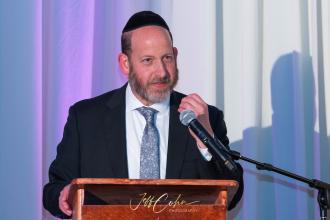The Trump administration’s promise to Israel this week that Iran will not be allowed to get “nuclear weapons capability” could indicate a US policy shift vis-à-vis the Islamic Republic, two Middle East experts assessed on Thursday.
A day earlier, a White House-published joint readout of the meeting between US President Donald Trump and visiting Israeli Prime Minister Benjamin Netanyahu said, “The two leaders agreed that the Iran nuclear deal is a terrible deal for the United States, Israel, and the world. The president assured the prime minister that Iran must not, and will not, obtain nuclear weapons capability.”
In a Thursday conference call for reporters organized by The Israel Project, David Makovsky — director of the Washington Institute for Near East Policy think tank’s Project on the Middle East Peace Process — said the language of the statement “might be signaling something.”
“Is he [Trump] saying that the United States will not allow Iran to get highly-enriched uranium, that’s weapons-grade uranium?” Makovsky stated. “It would be interesting to ask either at the White House or the Pentagon about the meaning of the phrase that they use because every word here is pregnant with meaning and the past administration did not want to use that word ‘capability.’ They said, you know, ‘they will not get a nuclear bomb, period.’”
Behnam Ben Taleblu — senior Iran analyst at the Foundation for Defense of Democracies think tank — told The Algemeiner, “While it’s too soon to tell how the new administration would approach this question, the emphasis on capability is instructive. It could mean that President Trump is interested in broadening the scope of the current nuclear deal. Should this be the case, it would be consistent with one of his campaign promises with respect to Iran, namely the renegotiation or improvement of the JCPOA (the July 2015 Joint Comprehensive Plan of Action agreed to by Iran and six world powers).”
“The previous administration which negotiated the JCPOA appeared driven by breakout timelines, which would lapse after key junctures in the deal’s implementation were reached,” Taleblu continued. “As we know it, for several years the DNI [director of national intelligence] stated that weaponization is a political, not technical issue for the Islamic Republic. This would indicate that Tehran already (even predating the nuclear deal) had some understanding of any of the following activities: the enrichment process, production of high explosives, a functioning delivery vehicle, and/or warhead miniaturization.”
“Cognizant of Tehran’s possession of that knowledge as well as the timeline-driven approach in the JCPOA to containing Iran’s nuclear program, the new administration could look to provide checks against what the DNI believes to be Iran’s likeliest delivery vehicle, a ballistic missile,” Taleblu went on to say. “Already, the administration signaled its resolve to Tehran by designating 25 persons and/or entities in response to a nuclear-capable ballistic missile test by Tehran in January. It could expand upon those sanctions and erode the technical capacity for the production of those missiles, as well as work to tighten export controls with partners and allies in Europe and Asia — key domains for Iranian illicit procurement for its missile program.”
Taleblu concluded: “Another way to erode this capability would be to vigorously enforce the deal as it stands, and not let Iran transgress an iota of any temporary cap imposed upon it by the JCPOA. Another would be to engage in negotiations designed to extend and roll-back the timelines that exist in the accord which permit Iran to significantly ramp-up its program. However, to have full knowledge of this capability, a thorough understanding of the Iranian nuclear program is in order, and that must be provided by the IAEA [International Atomic Energy Agency], which is set to issue a ‘broader conclusion’ on the Iranian program. The new administration must make sure that this investigation is not subject to a political timeline, and when necessary act on the IAEA’s behalf to compel Iran to provide the organization with access to sites and persons needed to declare the Iranian nuclear program a purely peaceful one.”















